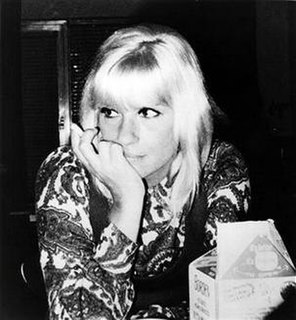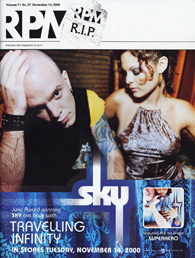
The Exciters were an American pop music group of the 1960s. They were originally a girl group, with one male member being added afterwards. At the height of their popularity the group consisted of lead singer Brenda Reid, her husband Herb Rooney, Carolyn Johnson and Lillian Walker.

The Dixie Cups are an American pop music girl group of the 1960s. They are best known for a string of hits including their 1964 million-selling record "Chapel of Love", "People Say", and "Iko Iko".

"I Can Hear Music" is a song written by Jeff Barry, Ellie Greenwich and Phil Spector for American girl group the Ronettes in 1966. This version spent one week on the Billboard Pop chart at number 100. Three years later, American rock band the Beach Boys released a cover version as a single from their album 20/20 (1969), peaking at number 24 on the Billboard Hot 100.
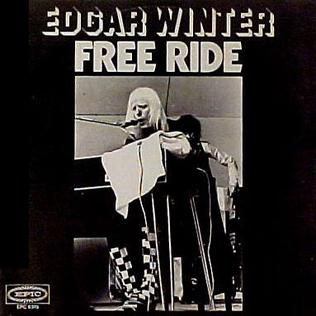
"Free Ride" is a song written by Dan Hartman and performed by The Edgar Winter Group. The single, engineered by Jim Reeves, was a top 20 U.S. hit in 1973, hitting number 14 on the Billboard Hot 100 and number 10 on Cash Box. In Canada, it peaked at number eight.

"Do Wah Diddy Diddy" is a song written by Jeff Barry and Ellie Greenwich and originally recorded in 1963, as "Do-Wah-Diddy", by the American vocal group The Exciters. It was made internationally famous by the British band Manfred Mann.
"Remember ", also known as "Remember", is a song written by George "Shadow" Morton. It was originally recorded by the girl group The Shangri-Las, who had a top five hit with it in 1964. A remake by Aerosmith in 1980 was a minor hit. There have been many other versions of the song as well.

"Who Loves You" is the title song of a 1975 album by The Four Seasons. It was composed by Bob Gaudio and Judy Parker and produced by Gaudio. It reached number 3 on the Billboard Hot 100 in November 1975.
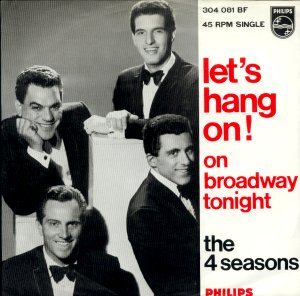
"Let's Hang On!" is a song composed by Bob Crewe, Sandy Linzer, and Denny Randell that was popularized by The Four Seasons in 1965. The single reached the No. 3 position in the Billboard Hot 100 singles chart, the group's highest placement since "Rag Doll" hit the top spot in July 1964.

"Loves Me Like a Rock" is a song by the American singer-songwriter Paul Simon. It was the second single from his third studio album, There Goes Rhymin' Simon (1973), released on Columbia Records. It features background vocals from the Dixie Hummingbirds, a Southern black gospel group. Although the lyrics are not typically associated with gospel music, the Dixie Hummingbirds were eager to record the song with Simon, and they recorded their own version of the song soon afterward.

"Like to Get to Know You" is a 1968 song from Spanky and Our Gang. Written by Stuart Scharf, the song debuted at number 71 on the Billboard Hot 100 on April 20, 1968, and peaked at #17 on June 8, 1968. It became a minor hit on the Billboard Easy Listening chart at the same time, eventually peaking at #24 the same week it peaked on the Hot 100. In Canada, the song reached #5 on the RPM Magazine charts. On the album of the same name, the song is broken into two parts: the full vocal, and a coda that echoes the chorus and conversation from the song.

"If You Know What I Mean" is a song written and recorded by Neil Diamond. The song is a track from Diamond's 1976 album, Beautiful Noise, and was Diamond's third number one on the Easy Listening chart, where it spent two weeks. "If You Know What I Mean" went to number one for two nonconsecutive weeks and peaked at number eleven on the Billboard Hot 100. In Canada, the song reached number 19 on the pop singles chart and hit number one on the Adult Contemporary chart.

"Johnny Loves Me" is a pop single by Shelley Fabares released in 1962 on Colpix Records. It was the first single taken from her second album, The Things We Did Last Summer. "Johnny Loves Me" was a collaboration written by Barry Mann and Cynthia Weil. The single was produced and arranged by Stu Phillips.

"I'm Stone in Love with You" is a 1972 single by the Philadelphia soul group The Stylistics. The song is noted for lead singer Russell Thompkins Jr.'s distinctive falsetto singing, which he employs through most of the record. The song was written by Thom Bell, Linda Creed, and Anthony Bell.

Everything's Archie is the second studio album released by The Archies, a fictional pop band from the Archie universe. The single "Sugar, Sugar" went to number one on the pop chart selling over six million copies and was awarded a golden disc. The single was ranked as the number one song of the year for 1969 according to Billboard. The album was later reissued on RCA Records, and in 2012 by Essential Media Group. Everything's Archie peaked at number 66 on the Billboard 200 albums chart.

The Archies is the debut studio album by The Archies, a fictional pop band from the Archie comics. The album was originally released on the Calendar Records label in 1968 and included 12 songs. It was produced by Jeff Barry and co-produced by Don Kirshner. The band's debut single was "Bang-Shang-A-Lang" and it hit number 22 on the Billboard Hot 100 in 1968. The album peaked on the Billboard 200 chart at number 88. The song "Seventeen Ain't Young" became a Top 40 hit in Australia for Frank Howson in 1969.

Chapel of Love is the debut studio album by the New Orleans pop girl group The Dixie Cups. The album was produced by Jerry Leiber, Mike Stoller, Jeff Barry and Ellie Greenwich. It includes 11 tracks and was first released on Red Bird Records in August 1964. It was available in both mono and stereo, catalogue numbers RB 20-100 and RBS 20-100.

Jingle Jangle is the third studio album released by The Archies, a fictional bubblegum pop band from the Archie comics universe. It was produced by Jeff Barry. It is their first album released on the Kirshner Record label. The album features the hit single "Jingle Jangle". That song peaked at number 10 on the Billboard Hot 100. The album peaked at number 125 on the Billboard Top LPs chart.
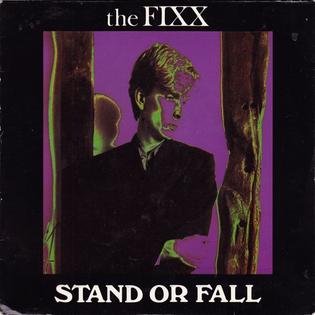
"Stand or Fall" is a song by new wave/rock band the Fixx. Released in 1982, it was the third of four single releases from the group's debut album, Shuttered Room.

"I Live for Your Love" is a 1987 song by Natalie Cole. It was the second of four charting singles from her Everlasting LP, and was also the second greatest hit from the album.
